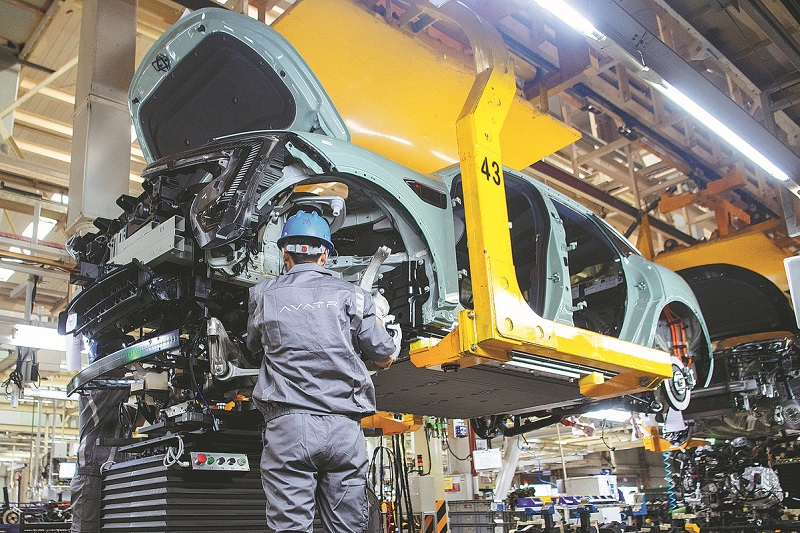Chongqing to build world-class NEV cluster, says municipal people's congress

An employee works on a production line of Changan Automobile in Chongqing in July. [Photo/Xinhua]
Chongqing, an industrial powerhouse in China, is catching up with Guangdong province in terms of auto production as it was runner-up in 2023, and it aims to build a trillion-yuan ($139 billion) level world-class intelligent new energy vehicle industry cluster.
"Chongqing has been making progress in building an intelligent network NEV industry cluster and in 2023, our auto production scale ranked second nationwide, including 500,000 NEVs," said Hu Henghua, mayor of the municipality, on Sunday during the second session of the sixth Chongqing Municipal People's Congress.
In 2023, Chongqing produced 2.32 million vehicles, a year-on-year increase of 30 percent, and exported 368,000 vehicles to more than 80 countries and regions, a year-on-year increase of 29.8 percent, according to Chongqing's economic and informatization commission.
In 2023, Chongqing's GDP reached a new level of 3 trillion yuan, up 6.1 percent year-on-year. This is the first city in central or western China with a GDP exceeding the 3 trillion yuan benchmark.
Chongqing has set a GDP growth target of 6 percent for this year, according to the government work report. The municipality, with over 32 million people in Southwest China, is one of the country's key vehicle production bases, boasting a complete auto industry chain and rich human resources.
In 2022, Chongqing put forward new goals — by 2025, production and sales of intelligent network NEVs will account for more than 10 percent of the country's total, and by 2027, the industry scale will reach first-class global levels.
"Chongqing's auto industry has achieved progress in terms of quantity, quality, supply chain building, overseas development and new energy infrastructure," said Tu Xingyong, deputy director of Chongqing's economic and informatization commission.
Local automakers Changan and Seres are speeding up their market expansion campaigns and factory construction in Southeast Asia, South America and Europe. The city boasts 210,000 charging piles and the number of battery swapping stations ranks second nationwide.
"This year, Chongqing's auto production will reach 2.6 million units, a year-on-year increase of 12.2 percent. By 2027, the city will produce and sell more than 2 million intelligent connected NEVs, with automobile exports accounting for 10 percent of the country's total, and the industry scale exceeding 1 trillion yuan," Tu said.
"Chongqing has complete technical routes and development models for new energy vehicles," said Hu Yuanzhi, dean of the school of vehicle engineering of Chongqing University of Technology.
Hu said Chongqing has advanced technologies for various types of NEVs, such as electric, plug-in hybrid, extended-range, hydrogen fuel and battery swap technologies.
"In terms of intelligent network connection, Chongqing boasts the most comprehensive and multidimensional 'vehicle-road collaboration' scenarios in China," he said. And it also leads the country in terms of testing capabilities, application scenarios and demonstration scale of intelligent network-connected NEVs, the dean added.
In 2022, Chongqing's Yongchuan district granted China's first unmanned autonomous driving permits to five Baidu taxis, allowing for no human driver or safety operator to be in vehicles running on public roads for the first time.
Hua Dubiao, chief expert of Chongqing Changan Automobile Co Ltd, pointed out that autonomous driving is an important direction for intelligent networked NEVs, and the integrated collaboration of cars, roads, networks, clouds and maps will become the focal point of competition among the global NEV makers.



